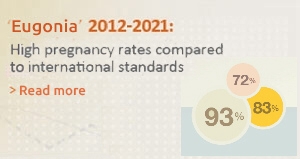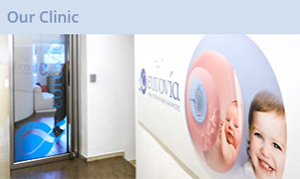The morula is observed on day 4 and is formed after the compaction and fusion of blastomeres of the dividing embryos. As the morula continues to develop, fluid starts to accumulate forming a cavity, the blastocoel, giving rise to the blastocyst.
Blastocyst
The blastocyst forms after 5 days of embryo culture. The mature blastocyst is characterized by expansion of the blastocoel due to accumulation of fluid, the thinning of the zona pelucida,and the formation of two distinct cell layers, the inner cell mass, that will form the embryo, and the trophectoderm, that will form the placenta.
The blastocyst for the evaluation of embryo viability
Development to the blastocyst stage is a sign of normal development and high developmental competence. It has been shown that embryos reaching the hatching blastocyst stage have double chances for implantation. At Eugonia, blastocyst formation rate is 54%. This high percentage reflects optimal laboratory conditions and experience of the scientific staff.
Activation of the embryonic genome occurs between 4 and 8 cells. Therefore, the contribution of the paternal DNA and the assessment of an embryo as a whole can be better performed 5-6 days after oocyte retrieval. This is particularly important for cases with poor sperm quality (oligoasthenozoospermia) or testicular biopsy.
Continuous development of culture media and laboratory conditions allow the development of embryos in vitro for up to 6 days without compromising their viability. However, there is a theoretical chance that the uterus may provide a more favorable environment for embryo development. Practically, however, in an IVF laboratory with high experience and quality control, embryos of higher developmental competence will grow to the blastocyst stage, providing the Embryologist a strong criterion for embryo selection. For this reason, pregnancy rates after transfer of blastocysts is higher and reaches 72% for women of all ages at Eugonia.
































